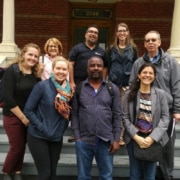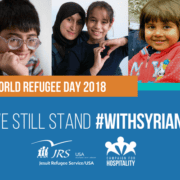BY KIM MILLER | June 12, 2018
“The work that we’re doing, even if we don’t see it every day, we see it in specific moments.”
Hicham Khanafer is project manager for Le Centre social d’aide aux Immigrants (CSAI), a refugee resettlement agency in Montreal, Canada. His sentiment was a common thread throughout the Canadian Migration Immersion Experience, which gathered 10 partners in Jesuit mission from May 22-25.
The immersion—co-organized by Norbert Piche of Jesuit Refugee Service/Canada and the Ignatian Solidarity Network—examined the Canadian approach to welcoming refugee claimants—a term equivalent in the U.S. to refugee or asylum seeker. Participants brought a broad understanding of refugee issues, representing organizations including Jesuit Refugee Service in the U.S., Canada, and Mexico; Migration and Refugee Services; Creighton University; and the Jesuits of Canada and the United States.

Outside Le Pont, a residence and place of refuge in Montreal for up to 30 refugee claimants on any given day.
(top) Kim Miller (Ignatian Solidarity Network), Joan Rosenhauer (executive director, Jesuit Refugee Service/USA), Eduardo Soto Parra, S.J. (Quixote House, Winnipeg), Laura Heinemann (Creighton University), Ken Gavin, S.J. (Brooklyn Jesuit Community; former executive director, Jesuit Refugee Service/USA)
(bottom) Ashley Feasley (USCCB Migration and Refugee Services), Ambroise Dorino Gabriel, S.J. (Jesuits in Haiti), Andrea Villaseñor (project director, Jesuit Refugee Service/Mexico)
The experience covered policies both promising and problematic.
Canada’s private sponsorship refugee program allows any group of five or more people or an organization to sponsor a refugee to resettle in their local community. As sponsors, they assist with housing, clothing, food, and social and emotional support for the length of the resettlement process—although the bonds forged last much longer.
The group had the chance to meet with Larissa*, a refugee from Syria, and Michael, who through collaboration with JRS/Canada was able to sponsor her resettlement. Their mutual respect for one another radiated throughout the conversation as they talked about Larissa’s first months in Canada, diving into learning French and securing a new job.
Larissa spoke candidly with the group, noting that she still has a great love for Syria and her family there, and at times questions her decision to move. But, in her words: “When you make the decision to move countries, you make the decision to change your life.” Larissa takes this determined spirit wherever she goes; during the war in Syria, she started working for Jesuit Refugee Service/Syria, which is how she eventually connected with JRS/Canada and Michael. “Even in a war which I could not control,” she explained, “I realized I could make a difference.”
Michael, who described his local community as very conservative, was inspired to take part in the private sponsorship process after watching the news and then hearing a presentation on private sponsorship organized by his local diocese. He noted that when his parish first heard the presentation “nobody was interested, period. Now I think they would think twice, having seen Larissa come to Mass, having had the opportunity to have dinner with Larissa.” It is in these specific moments, when combined, that the tides are turning in Canada.
Another notable difference between Canada and the United States is its approach to refugee claimants or asylum seekers. In the last year, Canada has seen a spike in claimants crossing the U.S. – Canada border at an unofficial border crossing called Roxham Road, two hours south of Montreal and just north of Champlain in upstate New York.

The Roxham Road unofficial U.S.-Canada border entry point.
The reasons for refugee claimants fleeing the United States for Canada was a topic of interest in itself—some reasons include the cancellation of TPS for Haitians and Salvadorans and an increasingly dangerous political climate—but the reason for that specific location for crossing is tied to Canada and the United State’s Third Safe Country Agreement (TSCA). Through this agreement, if an asylum seeker enters Canada from the United States through an official border crossing, Canada has the right to turn them away. The United States is now seeking to establish this agreement with Mexico, allowing it to turn away all asylum seekers who present themselves at official border points between Mexico and the United States.
TSCA does not apply to individuals who cross at unofficial entry points like Roxham Road, which until a year ago was simply a break in a paved road between two small New York and Quebec communities. The entry point is now guarded 24/7 by Canadian Mounted Police and marked by a fence and a security processing facility. Once claimants enter Canada through this crossing, their identities are verified and they are sent to a temporary housing unit a few miles away while their initial screening takes place.

Temporary housing units for recent refugee claimants, who spend just days here before moving on to housing through agencies like the YMCA.
Refugee claimants in Canada are guaranteed housing for 30 days through agencies like the YMCA, as well as healthcare and the right to work for the duration their claim is being processed.
Contrast this to the process in the United States, where asylum seekers receive no such rights, and on average, are kept in limbo for an average of 1,000 days while their case is processed. In many cases, asylum seekers—including children and families—have been held in immigration detention centers for some or all of this time. (American Immigration Council).

Alessandra Santopadre and Andrea Villaseñor at Le Pont.
It is in examining Canada’s approach to refugee claimants that we first encountered Alessandra Santopadre, founder of Le Pont, a residence and place of refuge for up to 30 claimants on any given day. Bolstered by Pope Francis’s declaration that empty convents should be used to house refugees, Alessandra went straight to the Canadian Bishops, declaring over and over again, “I want a place.”

Immersion participants during a refugee simulation developed by JRS/Canada. In small groups, participants were assigned identities of individual refugees and were lead through decisions amongst the group on what should be gathered when fleeing home, who would be able to apply for asylum in another country, and who would be forced to stay in refugee camps or live as urban refugees.
Her fierce determination paid off; in May of 2017, the diocese of Montreal offered to pay the rent for an unused rectory and for the staff’s salaries. By October, Le Pont, which means the bridge, opened its doors. Arthur Drieux, Le Pont house manager, and Alessandra continually stressed that Le Pont is a home, not a shelter. While the YMCA strives to provide the best housing they can, Drieux described it as “cold, sad, and dark.”
During their time at Le Pont, residents receive support in finding work, an apartment, and connecting with the best tools and references to settle into their life in Quebec. But in the moments not filled with paperwork, it mainly serves as a place to “exhale” in the midst of chaos.
It is clear that not everyone in Canada supports welcoming refugees, evidenced by the anti-immigration protests happening at the border while the immersion was taking place. But this has not stopped individuals and organizations from continually inviting long-time and newly resettled community members into reflection, dialogue, and—most importantly—encounter.
During one of the final evenings of the immersion, the group gathered for a dinner with 50+ parishioners from parishes around the diocese that have participated in the private sponsorship program. The dinner opened with a welcome from two women who had prepared an exquisite meal of traditional Syrian foods. These women are members of the newly formed Les Filles Fattoush catering company, which is comprised of 20 women who are fantastic cooks and are newly resettled from Syria. The company’s goal is not only to provide good food but to encounter people in their community through the sharing of food and culture.

Dinner served by Les Filles Fattoush.
While the immersion highlighted policy ideas and approaches for the United States consider, in the end, it illuminated the call to encounter. In working with government-assisted refugees, Khanafer noted that one of the biggest challenges in the resettlement process is an intense feeling of isolation. “You don’t necessarily know anyone in those first days,” he explained. It is through encounters and continued dialogue that a new country can begin to feel like a new home. In ending his conversation with the group, Khanafer relayed one of those specific moments when he felt CSAI had been successful.

Hicham Khanafer, project manager for Le Centre social d’aide aux Immigrants (CSAI), a refugee resettlement agency in Montreal.
Through his organization, Khanafer gathered 100 young adults—a mix of longtime and newly resettled residents, including students and politicians—for an open dialogue where refugees could openly share their experiences of resettlement and the challenges of the process. When everyone around the room shared where they were from, he noticed that everyone was listing off provinces like Manitoba and Québec. When he asked one of the young refugees about why they decided to share which Canadian province they had been resettled in, the answer was simple: “We’re from here now.” Later that night, as the young adults spilled into the streets to return to their homes, a young man who had recently been resettled let out joyful cries of “CA-NA-DA! CA-NA-DA!” Canada was home now.
These are the specific moments that remind us of the power of welcome. Of encounter. Of remembering that we are all children of God, called to walk together toward a more hospitable world.
*Name has been changed to protect the individual’s privacy.
Kim Coleman is the Integrated Marketing Director for the Ignatian Solidarity Network.


